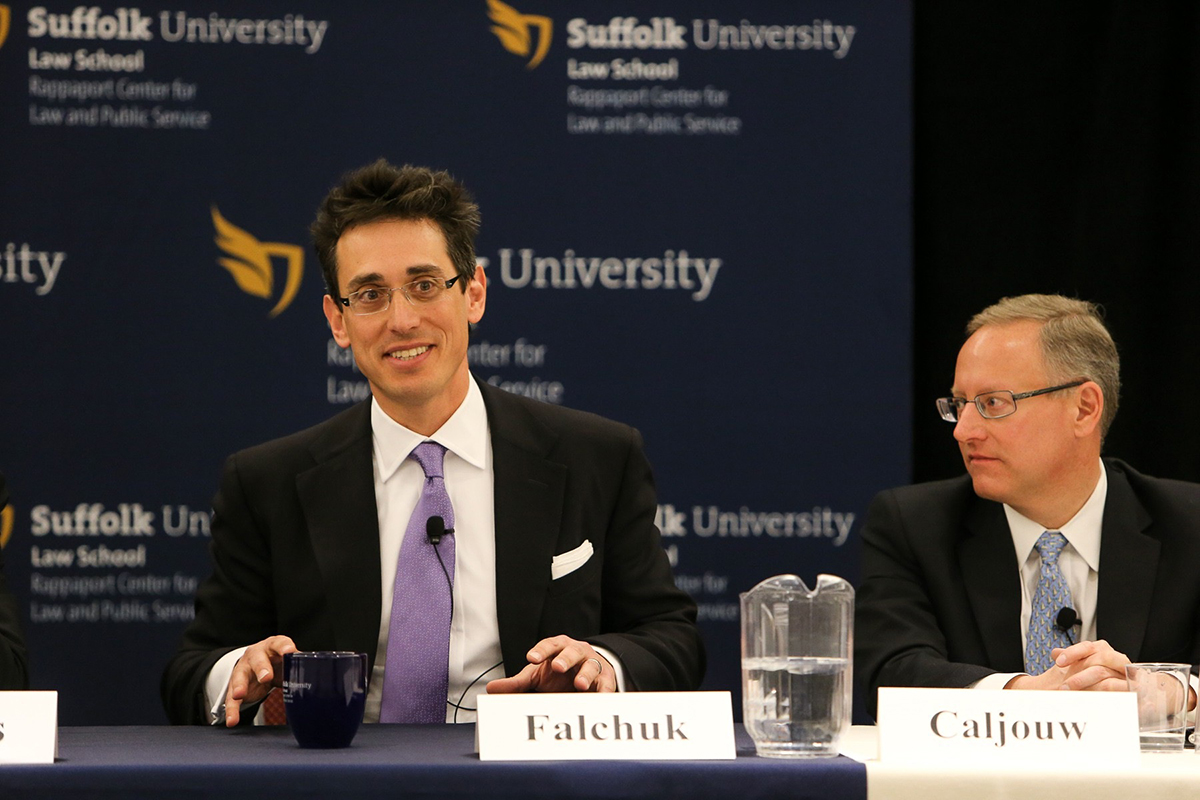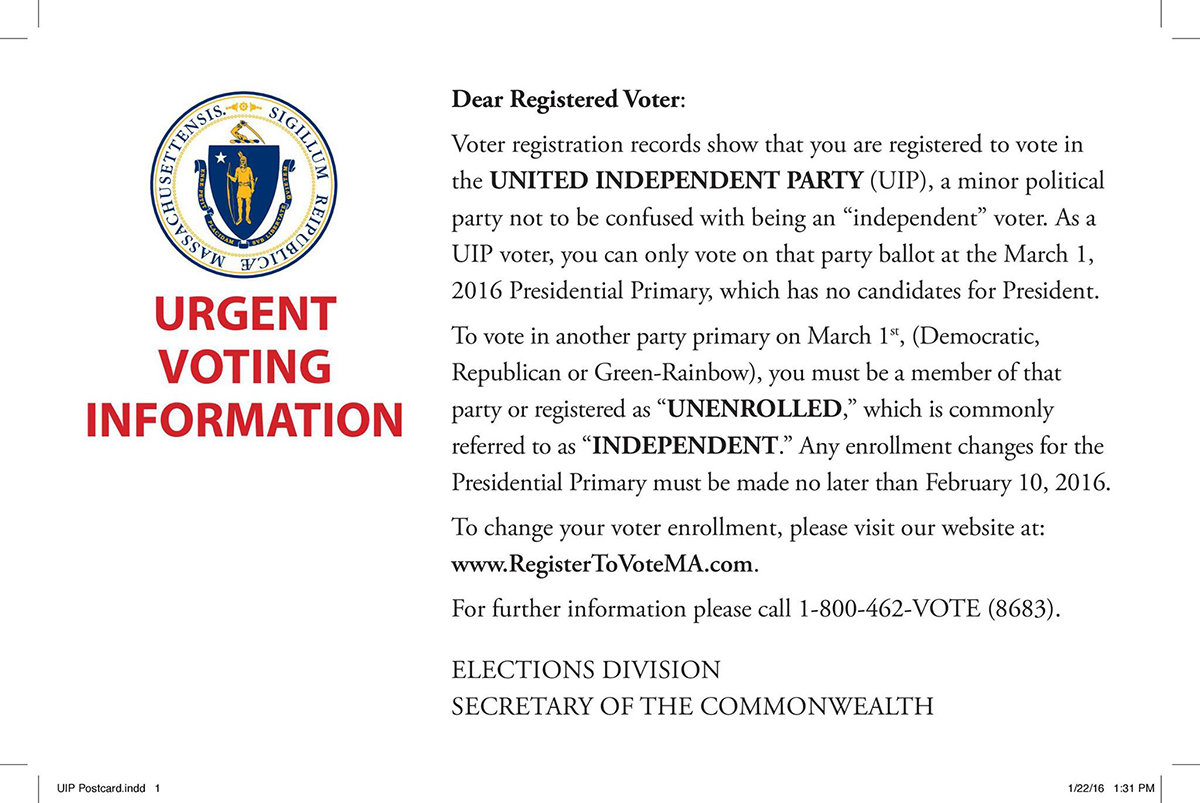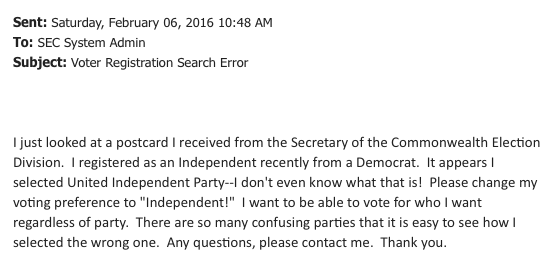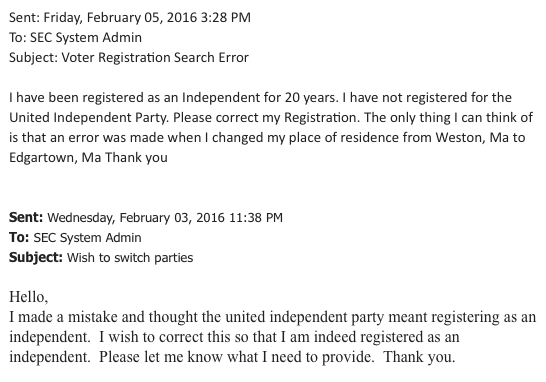Did Bill Galvin’s Warning to United Independent Party Voters Cross a Line?

Photo courtesy Evan Falchuk
Today is the last day to register to vote in Massachusetts and still be able to pull the lever in the March 1 Republican and Democratic primaries. As has been the case since leader Evan Falchuk garnered 3 percent of the vote in the 2014 gubernatorial race, the United Independent Party will be an option for voters, along with the Dems, GOP, or “unenrolled,” commonly referred to as “independent.”
This, Secretary of the Commonwealth Bill Galvin claims, could cause some confusion.
“It became apparent to us last month, as we ramped up our online voter registration, that many people were joining [Falchuk’s] party, when he has no candidates,” Galvin says. “Mr. Falchuk is the party’s only candidate. He is not running a campaign for president. He has no candidates, in his party, for president, unlike the Green Rainbows, who do. He has no state committee…He has nothing.”
Galvin’s office mailed postcards to 21,000 registered UIP voters late last month letting them know that “independent” is not the same as the UIP. Falchuk says he spoke with Galvin’s office and had no problem with the mailers as described.

Mailer Image courtesy Evan Falchuk
Thirteen states, including Maine and Connecticut, have closed primaries—that is, only members of a particular party may vote in their respective primaries. Massachusetts has a modified closed primary, in which only those registered as “unenrolled” may vote in either primary. Those registered with the UIP—20,914 as of January 13, Falchuk says—may only vote in its primary, which has no presidential candidates.
“When we saw that 21,000 people were in the party, my belief was, it must be an error on their part: that they were seeing the word ‘independent’ and registering in that party thinking they were registering as independents,” Galvin says.
Falchuk says the UIP supplemented Galvin’s postcards with its own emails to voters, public forums, voter registration drives, and social media posts. The UIP has even encouraged members to change party identification to be eligible for the other primaries and switch back later, he says. Galvin counts the number of departing UIP members around 5,500 as of Tuesday.
But it was the secretary’s remarks to WGBH Monday, in which he claimed some voters had likely enrolled with the UIP by accident (“I think that’s a very modest word), that has Falchuk crying foul.
“What was totally surprising to me was [Monday], finding out that Secretary Galvin is saying that people are confused, that have been enrolled in UIP, and they need to, in his words, go back to being independent if they want to vote, which is a very different-sounding thing than what we had agreed to,” Falchuk tells Boston. “To me, I hear those words and I think, this is just politicking. This is an elected official using his office not to educate voters and help them understand things, but rather to say, ‘We don’t think you should be involved in that party.’ I just don’t think that’s right.”
Galvin, however, disagrees. “I don’t understand what Mr. Falchuk’s complaining about,” he says. “I have an obligation to make sure that voters have the ability to vote the way they want to vote, and that’s my concern. My concern is if these folks, and I’m speaking now particularly the ones who remain in his party and didn’t join it intentionally, if they go into the polls on March 1 and try to pull a Democratic or Republican ballot, they won’t be able to do it.”
Falchuk says he’s heard instances of the opposite—that people have tried to register with the UIP, but their city or town clerk mistakenly changed their identification to unenrolled. Take this comment on the WGBH story, for example:
If there is any confusion, I don’t believe it resides with the voters. This is just an anecdote, but I had to fill out three voter registration forms in order to be properly enrolled in the United Independent Party. The first form I never heard anything, the second I got a response saying that I was enrolled as unenrolled, but fortunately the third time was the charm. Each time I clearly wrote down or checked my desired party affiliation as United Independent.
“If the focus was, ‘Let’s make sure people know how they’re enrolled,’ get out there and educate people. Make sure clerks understand how the process works. Make sure that voters get what the issues are and how it affects their ability to vote. But telling people that the people voting in UIP are confused, that’s not what happened, is pretty remarkable,” says Falchuk
“I think that’s absurd, given what the facts are,” Galvin says. Upon request, his office provided Boston with several emails from voters who claim to have registered with the UIP by mistake.


Galvin says the confusion over the word “independent” is nothing new, as evidenced by the American Independent Party of yesteryear, and isn’t going to change. “Efforts were made in the past to restrict the use of the word independent, and the courts have said you can’t do that,” he says.
The 2016 election cycle, with all its chaos and calamity, has proven a “remarkable advertisement” for the UIP, Falchuck says. “We’ve got people coming and joining us from all across the political spectrum. We’ve got former Democrats, we’ve got former Republicans. It’s really people who look at what’s going on in the system today and say, ‘Well, I don’t feel represented.'”


